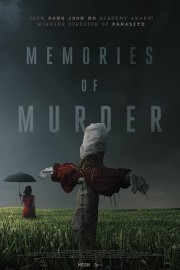Memories of Murder
It wouldn’t surprise me if David Fincher was inspired by Bong Joon-Ho’s “Memories of Murder” when he made “Zodiac,” and not just because both are based on true crime stories. Both films examine the obsession of police officers as they investigate serial killers whom will not necessarily reveal themselves until the final scenes. That obsession leads to some questionable choices on the part of the protagonists, which will effect not just their investigation, but their lives. Even years later, they won’t be able to shake the impact these crimes, and their pursuit of the truth, left on them.
I’ve seen enough of Bong’s films to know that he doesn’t have a particular style to his filmmaking, and that he adjusts his visual approach to what the story requires. For this true crime story, he uses what appears to be natural lighting with a hint of darkness as Detectives Park Doo-man (Kang-ho Song) and Seo Tae-yoon (Sang-kyung Kim) investigate a brutal series of murders in a small province in South Korea the likes of which the area has never seen before. Before Seo Tae-yoon comes into town from Seoul to assist in the investigation, Park Doo-man’s investigation has revolved around a mentally-handicapped boy, Baek Kwang-ho, whose grasp on what’s happening seems tenuous at best. Seo Tae-yoon helps Park navigate the intricacies of such an investigation, but it only occasionally seems to bring them closer to solving the case.
Bong’s storytelling instincts are precise and powerful, whether he’s working within the true crime genre, horror and action tropes, or social commentary like 2019’s Oscar winner, “Parasite.” He brings purpose to every frame of film, every close up, and every plot point as his characters navigate the world they are thrust into. One of the things most fascinating about “Memories of Murder” is how we see Detective Park, essentially, become a detective in this movie. He is ill-equipped to investigate such a case, which involves rape and seeming ritualistic practices; he thinks he can just look in someone’s eyes and tell whether he committed a crime. There are times when the film feels like a dark comedy a la “Fargo,” but Bong keeps the narrative in the shadows, showing us the impact on the community, as Park and Seo investigate this heinous crime.
Bong knows how to end a damn movie. The title of this film comes into focus in its final shot, but the scene that precedes it is a killer. Park and Seo seem to have a suspect in their grasp. He fits all the circumstantial evidence- they are just waiting for a DNA test they had to send off to America to come in. When it does, Seo’s frustration and pain unleashes in a moment as potent as the third act of “Parasite.” That’s not how the film ends. It comes back to Park, years later, no longer a cop. He returns to the fateful location of the first victim we see. He’s not alone, and the person there with him has info that might haunt him for the rest of his life, adding to the memories of a case that forever changed him.










